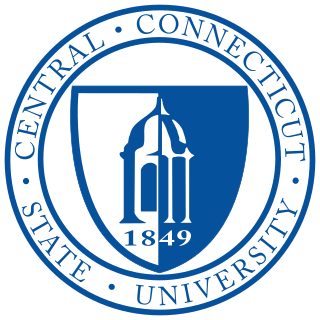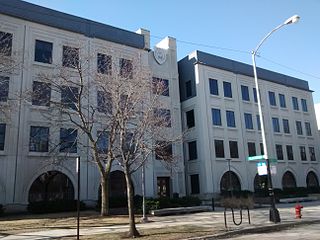
Pedagogy, from Ancient Greek παιδαγωγία (paidagōgía), most commonly understood as the approach to teaching, is the theory and practice of learning, and how this process influences, and is influenced by, the social, political and psychological development of learners. Pedagogy, taken as an academic discipline, is the study of how knowledge and skills are imparted in an educational context, and it considers the interactions that take place during learning. Both the theory and practice of pedagogy vary greatly as they reflect different social, political, and cultural contexts.

Central Connecticut State University is a public university in New Britain, Connecticut. Founded in 1849 as the State Normal School, CCSU is Connecticut's oldest publicly-funded university. It is made up of four schools: the Ammon College of Liberal Arts and Social Sciences; the School of Business; the School of Education and Professional Studies; and the School of Engineering, Science, and Technology. As of Spring 2022, the university was attended by 8,898 students: 7,054 undergraduate students and 1,844 graduate students. More than half of students live off campus and 96 percent are Connecticut residents. The school is part of the Connecticut State Colleges & Universities system (CSCU), which also oversees Eastern, Western, and Southern Connecticut State Universities.
The Hartt School is the performing arts conservatory of the University of Hartford, a private university in West Hartford, Connecticut. Founded in 1920 by Julius Hartt and Moshe Paranov, Hartt has been part of the University of Hartford since its charter merged the then Hartt College of Music, the Hartford Art School, and Hillyer College to create the university in 1957. The Hartt School offers undergraduate and graduate degrees in music, dance, theatre, and associated disciplines. The Hartt Community Division offers a variety of opportunities in music and dance for students of all ages, backgrounds, and abilities.
Learning styles refer to a range of theories that aim to account for differences in individuals' learning. Although there is ample evidence that individuals express personal preferences for how they prefer to receive information, few studies have found any validity in using learning styles in education. Many theories share the proposition that humans can be classified according to their "style" of learning, but differ in how the proposed styles should be defined, categorized and assessed. A common concept is that individuals differ in how they learn.
The Walden School is an organization which runs summer music education programs. It is based in Dublin, New Hampshire and has a year-round office in San Francisco, California. Since its founding in 1972, the Walden School has operated the Young Musicians Program, a 5-week long summer camp and concert series, which is the only summer program dedicated specifically to young composers in the United States. Students aged 9 to 18 study musical composition, along with a unique curriculum of music theory, specialty electives, and chorus. In 2011 the Walden School began running the Creative Musicians Retreat, an 8-day long program for adult musicians from all backgrounds to study choral music, composition, performance, and pedagogy. Both programs take place on the campus of the Dublin School, and they both feature visiting professional ensembles who help to perform new music written by participants, as well as composers-in-residence who inspire and mentor the participants. The Young Musicians Program also puts on a choral concert at the conclusion of the program. Along with participants from the United States, in recent years attendees have come from countries such as Cyprus, Israel, Mexico, China, India, Estonia, Canada, Serbia, and Venezuela.
The Connecticut Children's Museum is located in the Children's Building in New Haven, Connecticut, which houses three programs interwoven in purpose and philosophy: Creating Kids Child Care Center, Creating Curriculum Child Care Provider Training Program, and the Connecticut Children's Museum itself. These programs are inspired by the theory of Multiple Intelligences which concludes that children learn in different ways.
Horse Island, at 17 acres, is the largest of the Thimble Islands off Stony Creek, a section of Branford, Connecticut. It is owned by Yale University and is maintained as an ecological laboratory by Yale's Peabody Museum of Natural History. It was purchased and donated to the university in 1971 as a convenient addition to the Yale Coastal Field Station in nearby Guilford, which has its own dock and boats, and is also managed by Yale's Peabody Museum of Natural History.
King Philip Middle School is a middle school in the town of West Hartford, Connecticut. It is one of the West Hartford Public Schools as well as one of three public middle schools in the town of West Hartford. The school is beginning to move some homework and study related activities online by using Google Classroom along with related Google products, and by using PowerSchool, an online portal for grades and attendance.

Yale Corinthian Yacht Club is a public sailing facility located on Short Beach in Branford, Connecticut, home of the Yale University sailing team. It is generally abbreviated as "YCYC" and is affectionately pronounced "yic-yic."

The Yale Sustainable Food Program (YSFP) serves as a hub for the study of topics in sustainable food and agriculture at Yale University. Founded as the Yale Sustainable Food Project in 2001, the YSFP runs a campus teaching farm, supports a range of different curricular and extra-curricular study opportunities for both undergraduate and graduate students, and provides fellowships, awards, and grants for international and professional experience for Yale students.
Talcott Mountain Science Center for Student Involvement ("TMSC") is a not-for-profit 501c(3) corporation in Avon, Connecticut. It is dedicated to the improvement of science education and does so by working directly with students, teachers, and the general public.

The CSB Media Arts Center was originally founded as Connecticut School of Broadcasting in 1964 by Dick Robinson as a small, private school in Connecticut. Known now as the CSB Media Arts Center, it is the largest group of Digital Media Arts Schools that trains students for careers in emerging technologies.

The University of Chicago Graham School of Continuing Liberal and Professional Studies is one of eight professionals schools of the University of Chicago. The Graham School's focus is on part-time and flexible programs of study.

Evidence-based education (EBE) is the principle that education practices should be based on the best available scientific evidence, rather than tradition, personal judgement, or other influences. Evidence-based education is related to evidence-based teaching, evidence-based learning, and school effectiveness research. For example, research has shown that spaced repetition "leads to more robust memory formation than massed training does, which involves short or no intervals".

Differentiated instruction and assessment, also known as differentiated learning or, in education, simply, differentiation, is a framework or philosophy for effective teaching that involves providing all students within their diverse classroom community of learners a range of different avenues for understanding new information in terms of: acquiring content; processing, constructing, or making sense of ideas; and developing teaching materials and assessment measures so that all students within a classroom can learn effectively, regardless of differences in their ability.Differentiated instruction means using different tools, content, and due process in order to successfully reach all individuals. Differentiated instruction, according to Carol Ann Tomlinson, is the process of "ensuring that what a student learns, how he or she learns it, and how the student demonstrates what he or she has learned is a match for that student's readiness level, interests, and preferred mode of learning." According to Boelens et al. (2018), differentiation can be on two different levels: the administration level and the classroom level. The administration level takes the socioeconomic status and gender of students into consideration. At the classroom level, differentiation revolves around content, processing, product, and effects. On the content level, teachers adapt what they are teaching to meet the needs of students. This can mean making content more challenging or simplified for students based on their levels. The process of learning can be differentiated as well. Teachers may choose to teach individually at a time, assign problems to small groups, partners or the whole group depending on the needs of the students. By differentiating product, teachers decide how students will present what they have learned. This may take the form of videos, graphic organizers, photo presentations, writing, and oral presentations. All these take place in a safe classroom environment where students feel respected and valued—effects.
Carmel Academy was a Jewish private school in Greenwich, Connecticut, serving grades Kindergarten through 8. Also including transitional Kindergarten The school originally was located in Port Chester, New York.

The Frank H. Netter M.D. School of Medicine at Quinnipiac University, also known colloquially as Quinnipiac Medical School, or simply "Netter," is a medical school located in North Haven, Connecticut. Established in 2010.
Pre-assessment is a test taken by students before a new unit to find out what the students need more instruction on and what they may already know. A pre-assessment, is a way to save teachers time within the classroom when teaching new material. It is a great way to find out more about the students, what they are interested in and how they learn best.
The University of Connecticut (UConn) Neag School of Education offers undergraduate and graduate degrees in education, sport management, and leadership across four campuses, with the main campus located in Storrs, Connecticut. The Storrs location is the main UConn campus and is home to the Renzulli Center for Gifted Education and Talent Development, and additional locations are in Hartford, Waterbury, and Groton. It is ranked number 16 among public graduate schools of education in the nation. The schools' research and teaching programs have been funded by a wide number of institutions, such as the National Science Foundation and the Department of Education.








